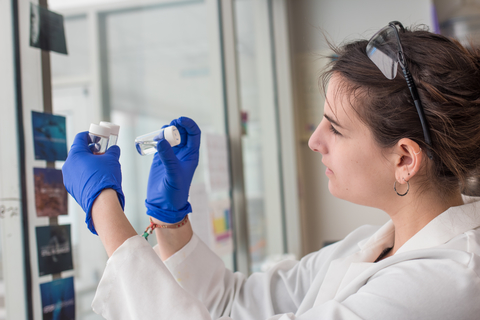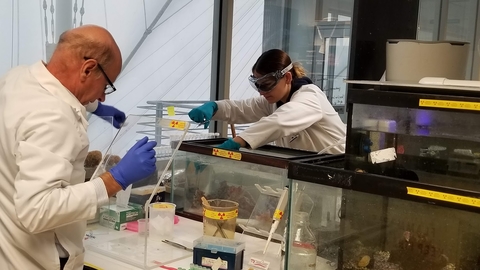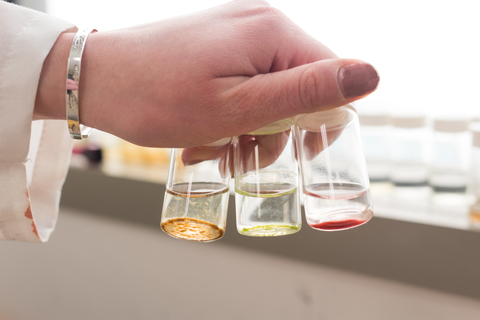UMCES Next Generation: Lauren Jonas
Advisor: Russell Hill
Degree: Marine Microbiology
What is the focus of your research?
I study bacteria in the ocean and how they cycle nutrients to support the life of other organisms. More specifically, I look at bacteria that live inside of marine sponges and how phosphorus moves throughout coral reef ecosystems. Similar to the way that bacteria live inside of us and keep us healthy, bacteria are inside a lot of marine animals like sponges.

Sponges pump water to eat, similar to how oysters filter water in the Chesapeake Bay. As sponges pump water through their system, the bacteria take in the nutrients suspended in the water and then expel different types of nutrients to help support life on reefs.
Phosphorous is one of the most common elements on earth and is used by all types of animals. It is a main component in our DNA backbone and plays a major role in how our cells produce energy. In order to study phosphorus, you have to use radiation, making it a harder nutrient to track and greatly understudied in coral reef systems.
How will it make a difference?
Understanding sponge biology and microbiology can give us a good look into the future and what coral reefs might look like. They play an essential role in supporting life in coral reefs as they are involved in all the major nutrient cycles.
What influenced your career path in science?
I have always wanted to be a scientist. I was a kid who grew up outside, with dirt under my fingernails, exploring the woods, and trying to do science experiments before I even knew what they were.

What is an experience that stands out most to you about your time at UMCES?
I loved my biological oceanography class. One of the major benefits of that class was the ability to take field trips to some of the different UMCES labs. I not only got to explore the different labs but was able to conduct plankton tows aboard the Rachel Carson.
What is the most important thing people can do to help the environment?
I think people can take a look at their lives and see where they can cut back activities that are not environmentally friendly. Often people feel like you have to do everything in terms of being eco-friendly, but you don’t. There is always something you can do. Every couple months you can reevaluate and work towards making more sustainable choices.
Do you have advice for kids in the next generation who are interested in STEM fields?
Work in a variety of places. What has helped me is the diversity of jobs I’ve held from education to business to science positions. Try a bunch of different things, and do what makes you happy.
 Have you received a scholarship, grant, travel award or gift from a donor? What did it allow you to do and why was that important?
Have you received a scholarship, grant, travel award or gift from a donor? What did it allow you to do and why was that important?
I received money from the Explorer’s Club, which allowed me to travel to Hawaii where I collected a variety of sponges for my research. I also received money from the Smithsonian Tropical Research Institute to travel to Panama, where I took a course on sponge biology and helped collect sponges. I was also awarded a travel award in memory of Debbie Morrin-Nordlund, which I was able to use to travel to Japan for a conference.
I am also a part of the Ratcliffe Environmental Entrepreneur Fellowship (REEF) Program awarded by the Ratcliffe Foundation, which supports my work at IMET for a year.
What are your future plans?
I plan to continue as an UMCES Ph.D. student looking at biodegradation in Dr. Russell Hill’s lab.